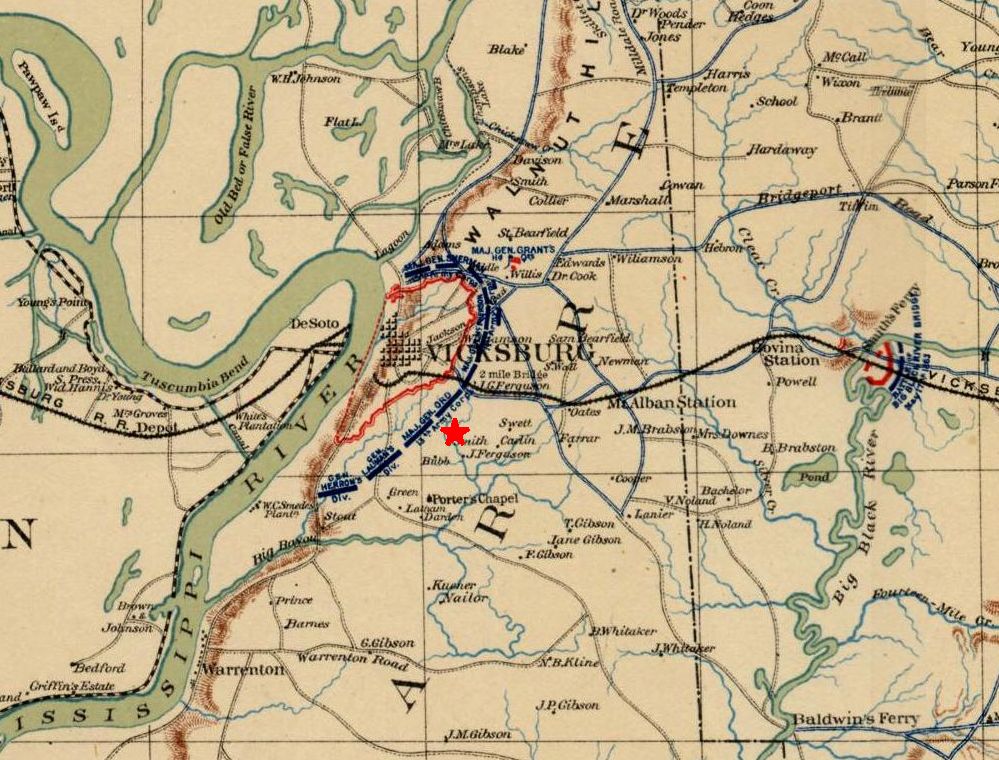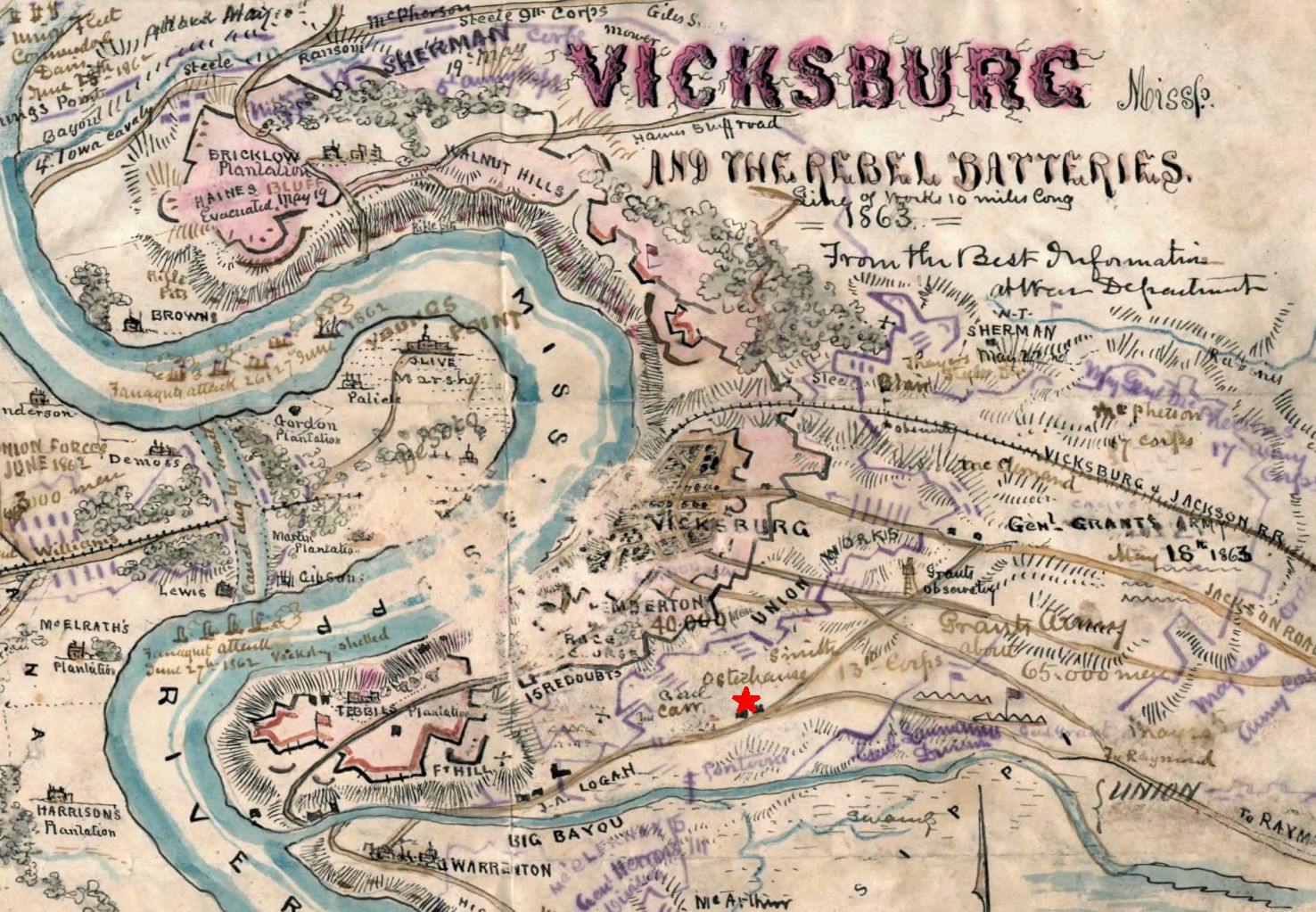| Previous Date | Day By Day Index | 16th OVI Home Page | Next Date |
Where was the regiment from
May 20 to 21, 1863
During these two days, Gen. Grant, now holding no more hopes of a weak and demoralized Confederate defense, decided a full frontal assault would be necessary to break through the Rebel lines. He now allowed his battle-weary troops to rest and nourish themselves in preparation for a second and more powerful attack. Though resting, Private Peter Perrine, Company C, tells us there was constant action and danger:
We kept up a continual fire on the enemy picking of their gunners.
Corporal Theodore Wolbach, Company E, takes this opportunity to describe the conditions and activity around the Rebel defenses at Vicksburg:
A group of large trees of the primeval forest, back of the enemy's line of works, furnished excellent lookouts for their sharp-shooters, and many soldiers of the 13th corps were struck by shots from these lofty perches. Against them the small arms had but little if any effect. Our artillery at times was directed at this source of annoyance and when they opened out in earnest they never failed to make the bark and branches fly. Cartridges for close quarters were issued to us. Instead of the bullet they contained twelve buckshot. These were to be used if an attempt should be made by the garrison to break out. There were so many exposed places to pass to reach our front line, that everyone that traversed the ground in daytime periled his life. When a man made the trip he made it lively and his steps were generally hastened by the zipping bullets that often raised little dust clouds close to his feet.
The 16th, badly reduced in numbers by the Chickasaw disaster and subsequent sickness, entered the campaign in slender force. No field officers being present the command of the regiment devolved on the senior captain present, Eli W. Botsford, of Co. C, a patriotic veteran of the Mexican war. He discharged the duties of this important and dangerous position with commendable ability and energy until the arrival of Major Milton Mills, June 3d.
On the night of the 20th, the 49th Indiana Infantry put into practice a trick that was a good sell on the Jonnies and furnished a little extra excitement for our part of the line. The Indianians, being on the skirmish line that night, suddenly raised a savage yell as if making a charge. The enemy supposing this to be the case opened a furious fire that went harmlessly over the heads of our men. This game was repeated by our boys afterward during a seige [sic] but the rebels smelt a mice and didn't fire much. In the darkness there was frequent hooting back and forth--the remarks exchanged were mostly of a taunting character. At some of the extremely critical points pickets were posted after dark and withdrawn at break of day. The boys hated this duty as they had to lay low and keep very quiet. We were nightly prepared to give the enemy a hot dose if they attempted a sortie. On the time-clouded screen of memory we can yet see by the weird light of exploding shell, the dim outlines of that formidable army crouching behind ridges or prostrate on the ground, ready to close with the enemy if he only ventured from the cover of his rifle-pits. The men in the extreme front, wrestling with sleep in the quiet hours of night, often fancied they saw moving objects. There is an instance in the writer's recollection of a squad that retired from an important post because they imagined the rebels had come out of their works and were advancing in force. The alarmed fellows were ordered back to their post by the officers in charge of the pickets; they reluctantly obeyed. Shots were often fired at objects that only existed in the soldier's imagination.
At the beginning of the seige our right wing had opened communication with the Yazoo, and supplies and reinforcements were coming to us by a route that led over the Chickasaw battleground. Some of the 16th boys went up to the scene of our last winter's fight, and viewed the place from a new standpoint and under more agreeable circumstances.
Deserters from the rebel garrison, that crept out at night, informed us that the citizens of Vicksburg were burrowing in caves dug in the hillsides to escape the dangers of the bombardment.
A number of buildings in the higher part of the city were in easy view of our lines, and at the mercy of our artillery. The upper part of the court house, with its belfry supported by four wooden pillars, was a tempting target for our gunners. The building was spared but one of the pillars spoken of was shot off.
The deepening shades of evening at the close of our third day before the works found our front line vigilantly watching the sterile slopes that were to be strewed with bloody corpes [sic] and helpless bodies on the morrow.
O how solemn is the subject
On which I now wish to write,
'Tis the fatal charge on Vicksburg,
Far more dark than ebon night.
Like a mighty surging billow,
As this sacred spot I tread,
So deep thoughts came rolling o'er me,
Here among the mighty dead.
Here lies husbands, lovers, brothers,
Sons and fathers in the tomb;
Far from loved ones they lied buried,
'Neath this deep and silent gloom.
* Believed to be original poem by Cpl. Wolbach.
* Information and italicized quotations from a series of articles entitled Camp and Field - The Old 16th Ohio, written in the 1880s by Theodore Wolbach, late Corporal in Company E, 16th Ohio Volunteer Infantry.
Period map showing the approximate position of the 16th Ohio with Gen. Osterhaus' division under Gen. McClernand (later under Gen. Ord as shown below):

A rather colorful, period map showing the various military works and units around Vicksburg during May through July, 1863. This map shows Gen. Osterhaus' Division which included the 16th Ohio:

| Previous Date | Day By Day Index | 16th OVI Home Page | Next Date |